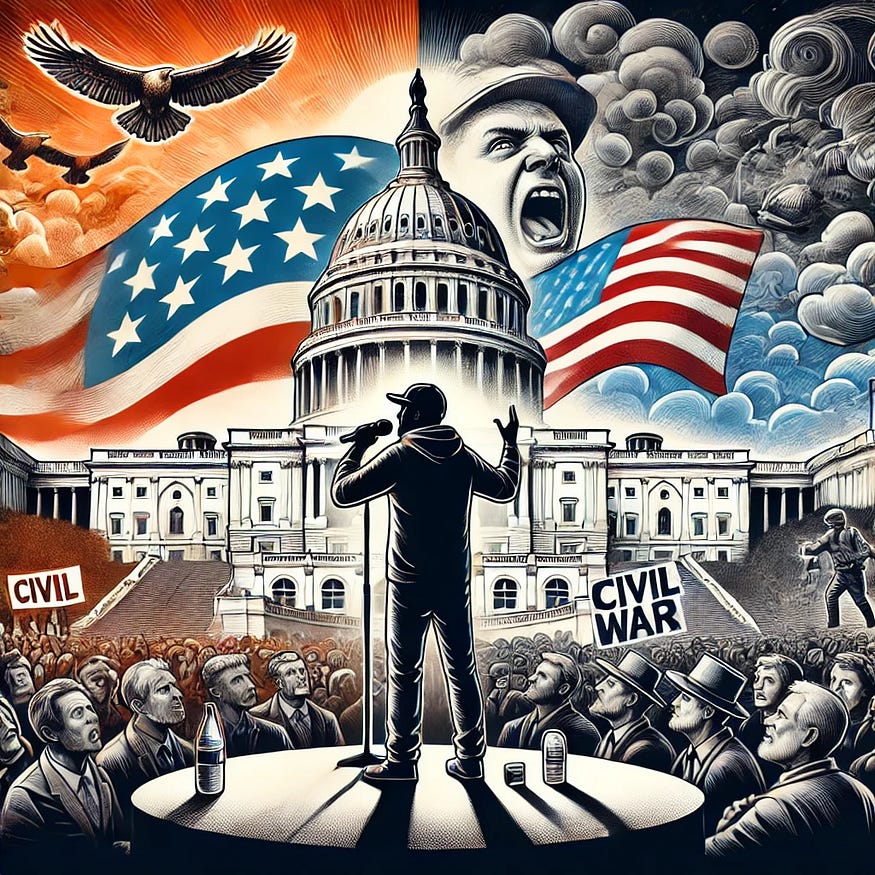Dangerous Civil War Rhetoric
The Dangerous Rhetoric of Civil War at Trump Rallies

Recently, a video emerged from a Trump rally where an attendee warned that if Republicans lose the upcoming election, it will “come down to a civil war” to take the country back. This statement reflects the extreme rhetoric that has become increasingly common in the MAGA movement, raising serious concerns about the potential for violence and the undermining of democratic processes.
The Implications of Civil War Rhetoric
1. Escalating Tensions:
Violent Overtones: The threat of civil war suggests an alarming willingness to resort to violence if the election results are unfavorable. Such rhetoric can incite individuals to take extreme actions, posing a threat to public safety and democratic stability.
Undermining Democracy: This type of language undermines trust in the electoral process and democratic institutions, implying that only a specific outcome is legitimate.
2. Historical Parallels:
January 6 Insurrection: Similar rhetoric was prevalent leading up to the January 6 Capitol riot, where false claims of a stolen election fueled a violent attempt to overturn the results. The insurrection serves as a stark reminder of the real-world consequences of incendiary political speech.
Echoes of Authoritarianism: Throughout history, authoritarian leaders have used similar tactics to mobilize support, create division, and justify undemocratic actions.
Possible Outcomes
1. Increased Polarization:
Deepening Divides: Such rhetoric exacerbates existing political divisions, making it harder to achieve bipartisan cooperation and compromise.
Radicalization: Continued use of violent language can further radicalize supporters, leading to an increase in politically motivated violence and extremism.
2. Democratic Erosion:
Erosion of Norms: The normalization of threats and violent language erodes democratic norms and principles, weakening the foundation of democratic governance.
Potential for Conflict: If this rhetoric leads to actual violence, it could result in significant harm to individuals, property, and the social fabric of the nation.
Addressing the Rhetoric
1. Leadership Responsibility:
Condemnation of Violence: Political leaders must unequivocally condemn threats of violence and civil war. Failure to do so can be seen as tacit approval, further inflaming tensions.
Promoting Unity: Leaders should promote messages of unity, resilience, and commitment to democratic principles. Encouraging peaceful activism and engagement with the political process is crucial.
2. Public Awareness:
Media Responsibility: Media outlets play a critical role in highlighting the dangers of such rhetoric. Providing context and expert analysis can help the public understand the potential consequences.
Education and Engagement: Public education campaigns that promote media literacy and critical thinking can empower individuals to recognize and resist incendiary rhetoric.
Conclusion
The rhetoric of civil war and violent resistance poses a significant threat to American democracy. It is imperative for political leaders, media, and the public to reject such language and work towards peaceful, democratic solutions. The events of January 6 demonstrated the potential for rhetoric to incite real-world violence. As the nation approaches another election, it is crucial to uphold democratic principles, foster unity, and ensure a peaceful transfer of power.

